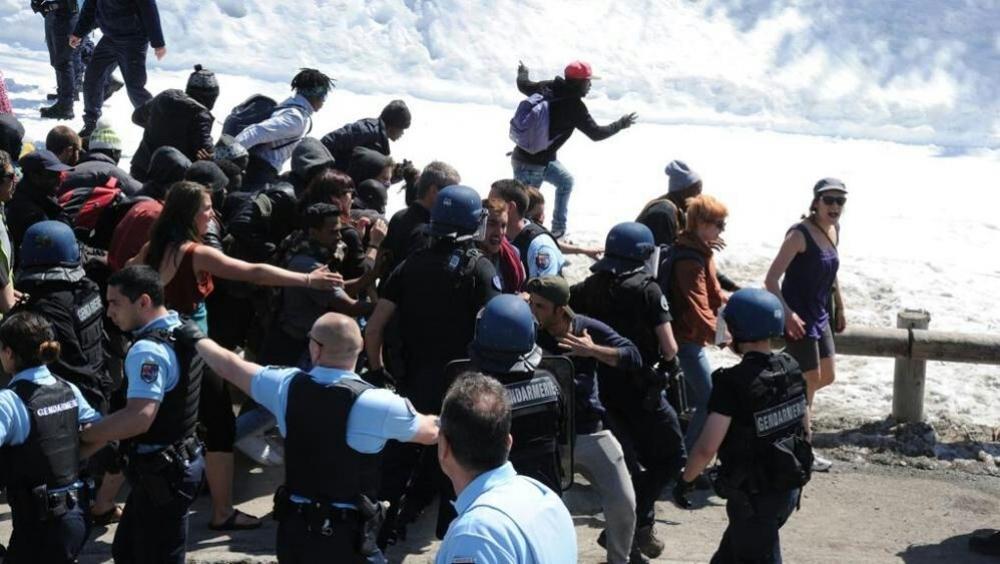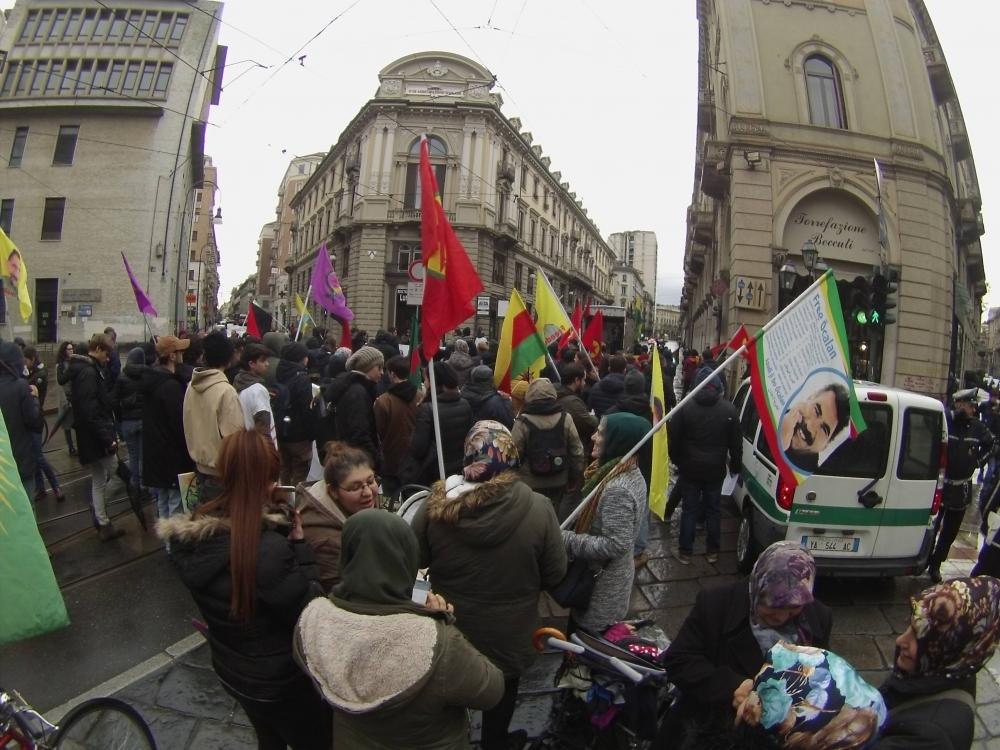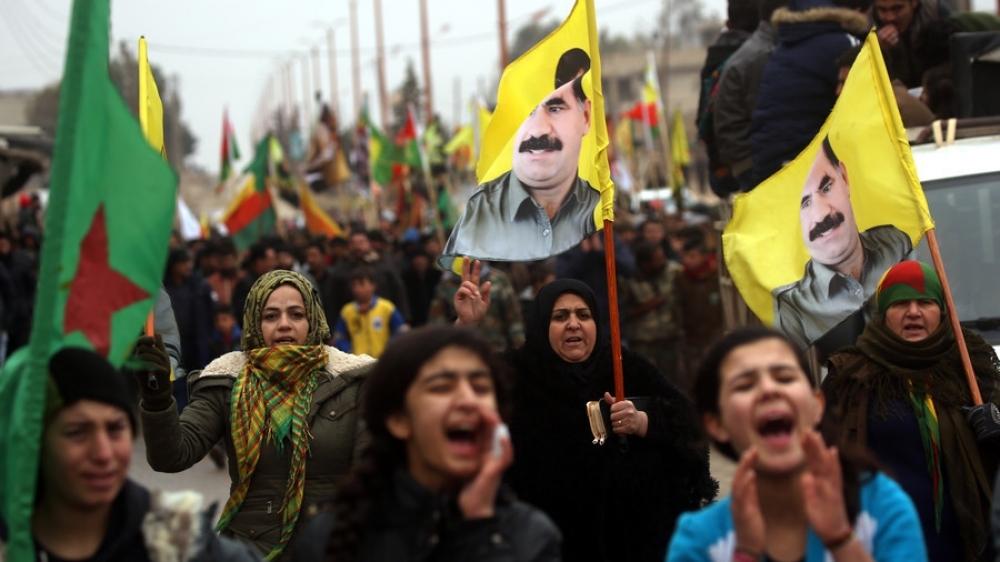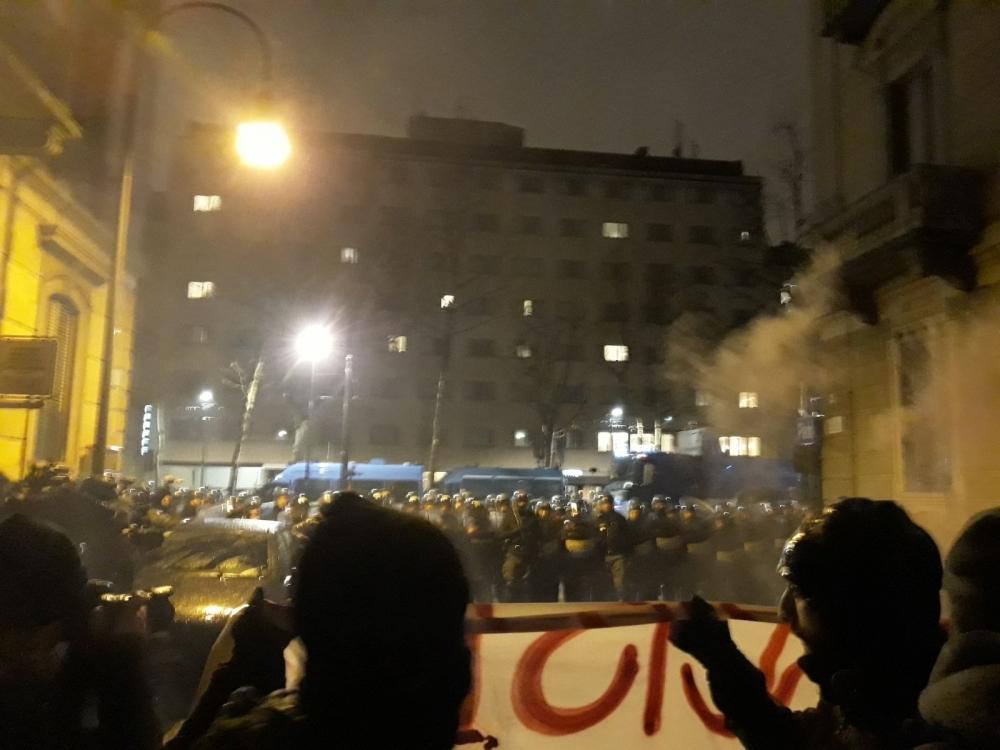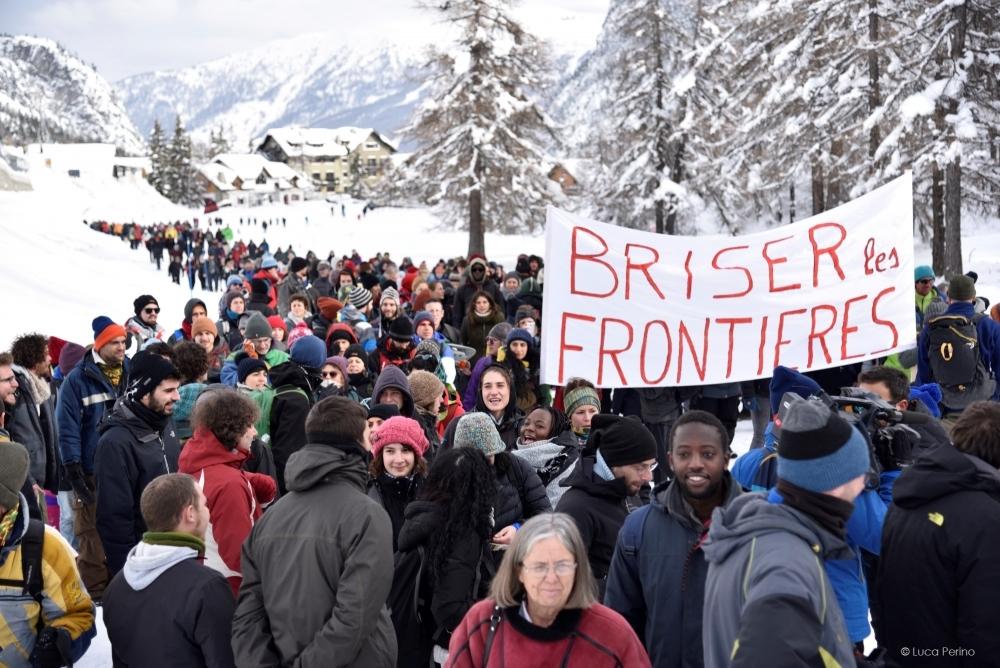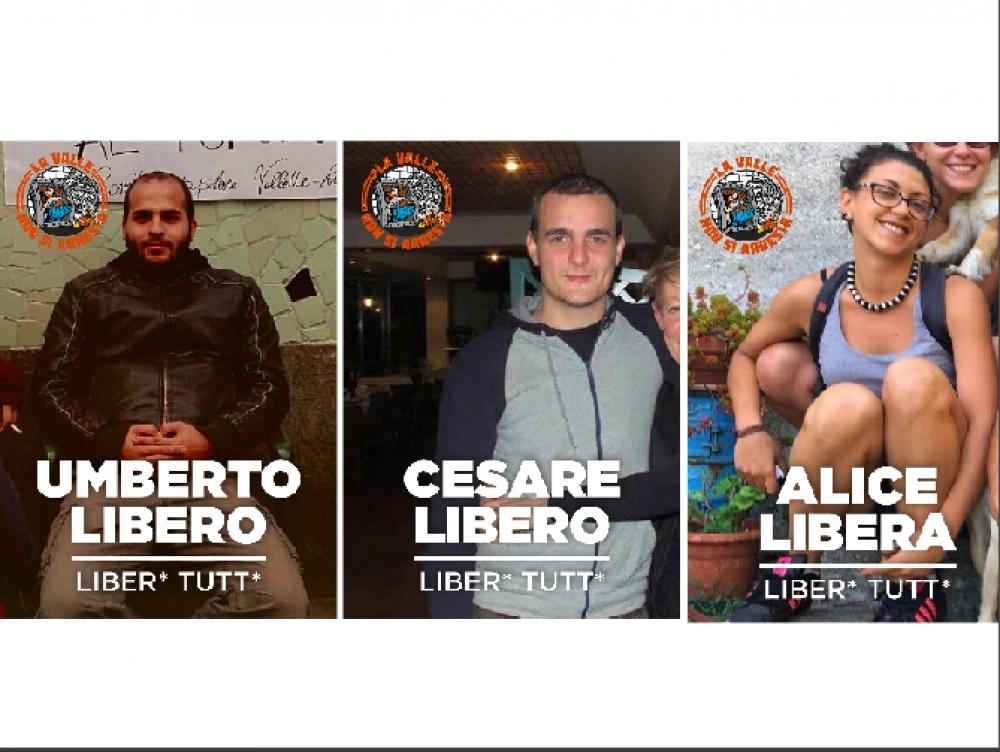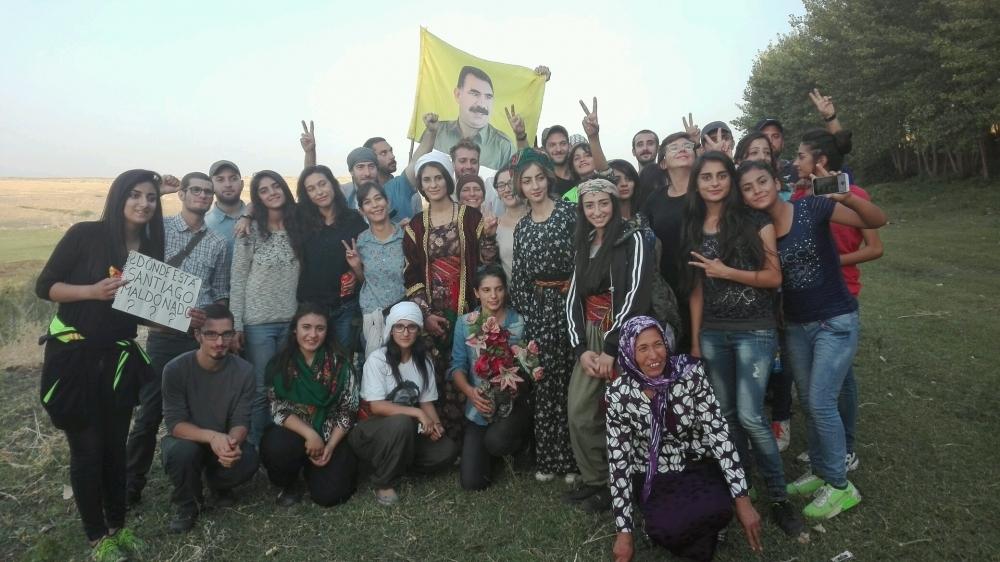
Not everyone likes Expo
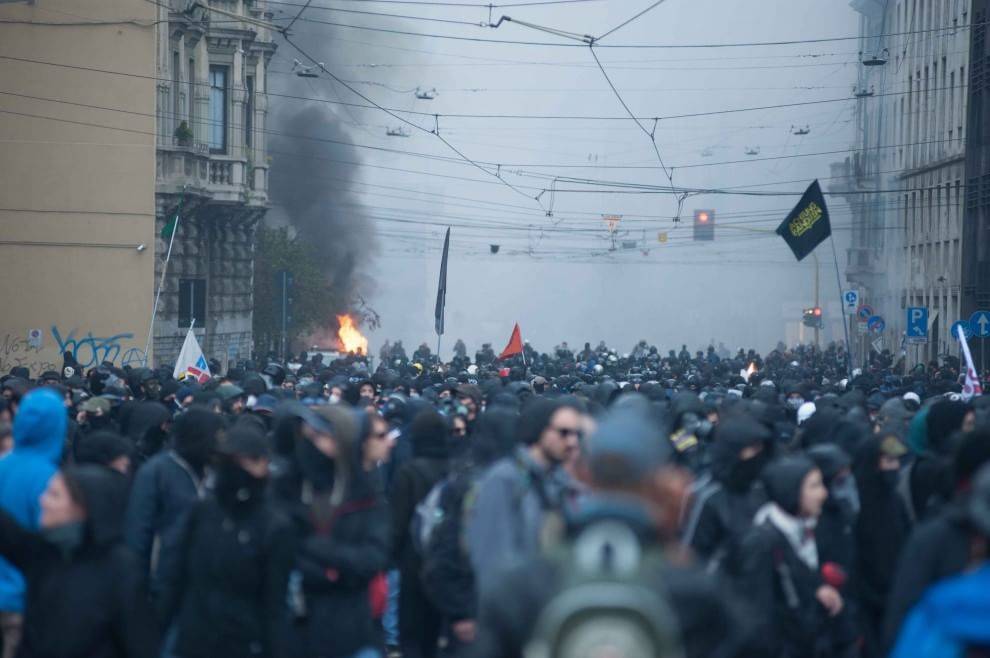
The First of May in Milan gives us a multi-faceted day. The first fundamental fact to realize is that those tens of thousands of people who took to the strees represent a social spectrum which cannot be co-opted by mainstream politics and party representation.
Overall, these presences managed to strongly express the refutation of a city modeled around the Expo, firmly overturning that “valorization of the territory” that the bosses of food products content themselves with. Ultimately smashing that Expo-ization of the city that saught to cordon off the space of political possibility of action of those who oppose the developmental model embodied in the mega-event of concrete and unpaid work.
There was only one answer to be delivered against the insolence of the police department that decided a few days before the demonstration to set up a no-go area and forbid a route of the demonstration that had been agreed on for months. The city does not belong to Expo: from the peripheries to the centre, it was important to try to breach the no-go area demonstrate this. It was a composite march, with heterogeneous practices in which every organization that participated in the process of opposition against the mega-event had space to express themselves. Radical practices of antagonism cohexisted with the coming together of young precarious workers and housing occupiers from different cities, direct action and music alternated in order to protect the different groups that were present.
It was an important First of May in as much as it was able to clearly demonstrate an incompatibility between the Expo-model and that part of the country that does not accept general impoverishment as an unavoidable aspect of a “recovery” that is just a rhetorical ploy to force us to an ever increased belt-thightening. The political achievement of the youth component that animated, in huge numbers, the march, was in identifying the Expo as a legitimisation and celebration of those frameworks of precarity that we have been enduring for decades, dismantling the rhetorics of those who wanted to disguise the Expo as a “new beginning”.
It is an achievement that informs us of a space of possible and real opposition to the Renzi juggernaut and the party of the nation [1], of a resoluteness of the social tensions that cross the territories. The prime minister wanted a showcase in order to show the best of Italy. He got it in this First of May of struggle: the Italian excellence is to, together, take back the streets. With all its limits the march of yesterday is the first big and firm protest against Renzi and his developmental model, and it will be remembered as such.
But it was also a day of protest against the Europe of crisis, in continuity with that M18 demonstration in Frankfurt that showed us a possible recomposition on the level of antagonism outside and against the Union’s governance. At the Expo there were heads of state from all of Europe, and from all of Europe people came to protest them. Surely we are stir tell talking about stuttering dynamics, and the reciprocal misunderstandings are multiplied by different political cultures and levels of radicality among our territories. It is a true work of translation, in the widest sense of the term, on which we still have a lot of work to do. But it represents a wealth, nonetheless, to see that minimum prospect of struggles that is Europe, materializing itself, at last, in the spread of conflict, and not in the exchanges between political elites [2].
These are the positive considerations that we feel should be made in regards to this day of struggle. Still, many critical issues remain, about which we have to work together…and which will only be possible among those who feels sincerely like taking on the challenge.
The issue, as usual, is not in the identities, but in the method. To reason about which practices make us stronger and emphasize the even wider fault lines within a society characterized by latent and widespread rage. To randomly smash cars or shop windows is an idiotic action that makes sense only for he who assumes, as an interlocutor of his own “political” act, his own minimal, self-centered background. As for us, our referential social subject stays always that of impoverished people, of the homeless, of the youth, of the migrants and of all that humanity from which any prospect of radical change of the existing state of things depends.
Yet, we would like to present the indignant commentators that today dominate the social networks and, more generally, the web, with some short remarks:
1) that part of the march that today is summarized and trivialized with the “black bloc” label – and that grouped together, on the contrary, even very different and multi-layered political and social compositions – whether one may like it or not, was the biggest in the entire march. To those who, even now, pretend to negate this evidence, we ask you to look back at the entrance of via De Amicis, where one could see the ranks swelling and many youths flocking from other parts of the march to that bloc.
2) there were collective and individual subjectivities gathered there, that intented to practice some form of antagonism: exercise of force, practice of the objective, disruption of the compatibility of eternally self-same and totally inconsequential parades.
3) the rest of the march was not impaired or put in any physical danger by the clashes and the actions that were produced there. One could say that was thanks to the careful management of the police forces that let that composition vent and avoided the spreading of the commotion and its escalation to a point where it could not be managed. That is true, but the truth lies in the relation of what the police department chose in front of a massive presence and also the difficulties of coping with it. An effective force was on the ground, and it was little open to forms of dialogue.
In an article [3] – what’s more, an awful one – Luca Fazio gets at least one political fact correct: it is necessary to deal with that attitude, and no organized framework, on these occasions, has been able to exercise a complete force of control and direction. It is a worth core issue to develop and work with. Starting from one premise: the rage, the composition, those subjects matter to us and we want to deal with them, with all the related caveats. He who calls himself out – out of evaluation, fear or alleged political and moral superiority – is drawing a dividing line between the literates of politics and the impoverished and enraged that in some occasions take the stage. It established a hierarchy of political apartheid between people who can be represented and people who can’t.
It is a play we are not endorsing. To worry about the risk of drawing a dividing line between the militants and the rest of the population is a commendable and necessary thing (the crux of consensus). To not consider the issue of how to incorporate and give sense to a latent and necessary rage (the crux of conflict) is an indecisive and short-sighted choice, even more so for he who represents himself as a conflictual and antagonistic option while actually thinking each time only and exclusively about saving his own skin and securing the reproduction of his own small group, always keeping open channels of mediation and dialogue that do not lead anywhere anymore.
There is a lot to say, reason through and comment on regarding what happened yesterday. Still, first and foremost, it is mandatory to make clear where we are standing and with whom. About the fact that it is a thousand times more preferable to find ourselves the next day having to deal with unexpected consequences and outcomes rather than the same back-slapping among the infinite shades of a political elite which is constantly scared by the appearance of any thing exceeding expectations. Athens, Baltimore and Istanbul are around the corner. Let’s acknowledge this and equip ourselves accordingly. There are those, instead, who think themselves to be still in the social forums age or, even worse, in the glorious thirties. It is not (anymore) like that.
—–
[1] “Party of the Nation” is a definition of the Renzian attempt to water down the already weak political and partisan (in the terms of representative politics) centre-left character of the Democratic Party, in order to reshape it as a natural, catch-all, party.
[2] A reference to the formalism of certain political players in the Italian movement, which favour largely advocacy-centered tactics issued by artificial coalitions of political groups and organizations in order to defend and widen political rights
[3] Published on the leftist “Il Manifesto” daily immediately after May 1
Ti è piaciuto questo articolo? Infoaut è un network indipendente che si basa sul lavoro volontario e militante di molte persone. Puoi darci una mano diffondendo i nostri articoli, approfondimenti e reportage ad un pubblico il più vasto possibile e supportarci iscrivendoti al nostro canale telegram, o seguendo le nostre pagine social di facebook, instagram e youtube.












